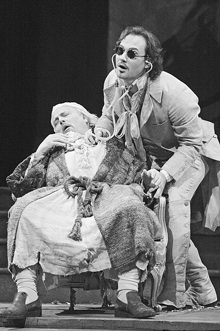Deluxe cast in a lackluster Met production of “Don Pasquale”
“Don Pasquale” is not the easiest opera to bring off dramatically under the best of circumstances. But that hardly excuses the ineptitude of Otto Schenk’s staging of the Donizetti comedy at the Metropolitan Opera, seen April 3.
The classic plot of teaching an old man a lesson by marrying him off to a shrew can seem cruel today, especially when you consider that the median age of the Met audience is somewhere over 60. For the comedy to be genuinely funny, the stage director and the performers have to find a way to demonstrate Pasquale’s obstinate foolishness to the audience instead of expecting them to take it on faith.
Unfortunately, Schenk’s production does not address or even acknowledge these issues. The designs for the sets and costumes by Rolf Langenfass are in a style that could be called Sybilism, after The Sybil B. Harrington Endowment Fund that has bankrolled many of the Met’s least interesting productions of the past quarter century. The hallmark of the Syblilistic style is a minutely detailed naturalism that paradoxically manages to appear utterly phony.
The effect is decorative but lifeless, with as little meaning as a department store’s Christmas window display. Schenk’s contribution consisted of little more than traffic direction and the occasional hoary sight gag. The production looked particularly listless in contrast to the deluxe cast. Simone Alaimo in the title role gave a traditional performance in the very best sense of the word, playing up to the audience and landing every syllable of the text. But this is the kind of performance any old pro can give in an under rehearsed provincial revival; surely audiences at the Met deserve something more polished.
Tenor Juan Diego Flórez returned to the cast after an allergy attack sidelined him on opening night. Only the slightest hint of strain toward the end of his long second-act aria marred an otherwise deliciously sung performance. His light, utterly true voice is a delight in itself; what a bonus, then, that his performance is so elegantly musical, though never self-conscious or precious. The juvenile leads in comic opera do not offer much in the way of acting challenges, but Flórez’s boyish charm brings to life even the stick figure of lovesick Ernesto.
The roar that greeted Anna Netrebko’s curtain call is ample evidence that the audience adored her Norina. Netrebko is a beautiful woman and a sincere, committed performer whose pearly lyric soprano surmounts the coloratura challenges of the role with gusto. And yet, even for a star in a star role, sometimes less is more.
In her opening aria, Norina sings “Conosco i mille modi dell’amorose frodi,” which means something like “I know a thousand ways to play the game of love.” This Norina, alas, knew only one way, an over-the-top “Taming of the Shrew” slattern act. Something of this coarseness infected her singing too—from time to time high notes turned harsh and glassy. There is no doubt that Netrebko is a star; all she needs is a little editing to become a great artist.
La Netrebko could learn a thing or two by observing her colleague Mariusz Kwiecien, the gifted baritone who sang Malatesta. This is a voice born for bel canto, warm and silky with a fascinating dark tint. The legato is as near perfect as makes no difference, and his Italian patter held its own against the native Alaimo’s. Kwiecien matched Netrebko antic for antic, and yet, the baritone never seemed to break a sweat. Kwiecien’s talent is going to be an enormous asset to the incoming Peter Gelb administration; which is a lot more than I can say for the production he was singing in.
gaycitynews.com

































